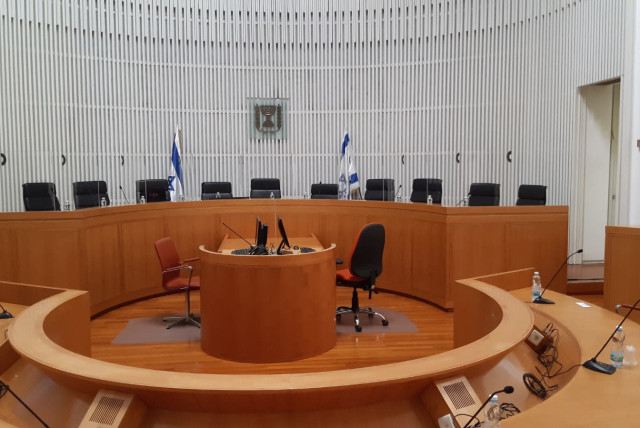Court orders Levin to hold vote for permanent chief justice by January 16

High Court to hear petition over justice minister ignoring directive to appoint chief justice.
The High Court of Justice ruled on Thursday that Justice Minister Yariv Levin must hold a vote to appoint a permanent Chief Justice by January 16. The ruling indicates a new phase in Levin’s ongoing struggle with the court over his attempt to appoint Yosef Elron, his preferred candidate, as chief justice, despite the fact that the committee with near certainty will appoint Interim Chief Justice Yitzhak Amit to the position.
The ruling came in response to a petition by the Movement for Quality Government in Israel to designate Levin in contempt of court for failing to follow its September 8 ruling to appoint the chief justice without delay. The ruling in effect rejected the petition – they gave Levin the benefit of the doubt, since the September ruling did not explain what “without delay” meant, and set the date of January 16 in order to provide a deadline.
Levin has argued that the High Court has a conflict of interest and cannot force him to appoint a chief justice, since the appointment directly affected the judges themselves. He accused the judges of forcing the vote upon him in order to ensure that Amit is elected. The judges, however, argued in the September ruling that the issue had nothing to do with the identity of the chief justice, but rather that the law required Levin to hold the vote, and did not grant him the power to delay it incessantly.
In comments made on Thursday evening, Levin called the order "illegal and shameful." He added that it "epitomizes the loss of direction, the disconnection, and the trampling of a handful of extremists."
"The Supreme Court judges are taking over the powers of the government and the Knesset, trampling on the people's choice, repeatedly throwing away the votes of millions of Israeli citizens, and turning themselves into dictatorial rulers, intervening and deciding everything, instead of the popular choice."
"Israeli citizens have the right to live in a democratic country with a judicial system, and not made to be the servants of a handful of masters who think that the court rules supreme over the country and its citizens."
Earlier on Thursday, Levin convened the committee responsible for electing Israel’s judges on Thursday for the second time in two weeks, yet again refrained from holding the vote to elect a permanent chief justice. Levin, who has the authority to convene the committee, wrote in a letter on Wednesday that the meeting would include a vote on whether or not to provide live footage of the debates, and then include a theoretical debate on the merits of the “seniority system,” The “seniority system” is a tradition whereby the committee elects the longest-serving member of the court to the position of Chief Justice.
The proposal to provide live footage was not accepted, with members of the committee claiming that it would violate the privacy of the candidates and lead to a “chilling effect.” Levin countered in a statement following the meeting that the fact that the proposal was not accepted proved that the process was “biased from its foundation,” and accused the members of the committee who opposed the measure of “preventing the public from seeing the truth.”
Levin invited five experts to appear before the committee for the debate on the “seniority system.” All five of the experts are associated either with the pro-judicial reform Kohelet Forum or were publicly in favor of the reforms: Rothman, Prof. Talia Einhorn, Prof. Avi Diskin, Prof. Gidi Sapir, and Dr. Shuki Segev. According to a source, the judges in the committee left the meeting while it heard the experts, since, according to the seniority system, all three judges on the committee, Amit, Noam Solberg, and Dafna Barak-Erez, are slated to become Chief Justices in the future.
Levin's argument
Levin, alongside Knesset Constitution Committee chairman MK Simcha Rothman, was the driving force between the government’s controversial judicial reforms in 2023. A central tenet of the reforms was a reformation of the makeup of the Judicial Appointments Committee. The nine-member committee currently has a majority of non-politicians: It includes three High Court judges, two representatives of the Israel Bar Association (IBA), two ministers, and two members of Knesset (one of them from the opposition). Levin, Rothman, and others attempted but ultimately failed to pass a bill to alter the makeup of the committee such that politicians would make up the majority.
In addition to delaying the chief justice vote, Levin has also refrained from filling three vacancies on the High Court bench, but unlike the appointment of a chief justice from amongst the current judges, the court in September ruled that Levin had the authority to continue delaying the three appointments of new judges.
Opposition leader Yair Lapid said Levin had "tried to turn Israel into an undemocratic state with his illegal coup d'état."
He also called Levin "one of the main people responsible for the October 7 disaster."
"Instead of getting the State of Israel back on track, he is deepening the chaos and constitutional crisis."
Jerusalem Post Store
`; document.getElementById("linkPremium").innerHTML = cont; var divWithLink = document.getElementById("premium-link"); if (divWithLink !== null && divWithLink !== 'undefined') { divWithLink.style.border = "solid 1px #cb0f3e"; divWithLink.style.textAlign = "center"; divWithLink.style.marginBottom = "15px"; divWithLink.style.marginTop = "15px"; divWithLink.style.width = "100%"; divWithLink.style.backgroundColor = "#122952"; divWithLink.style.color = "#ffffff"; divWithLink.style.lineHeight = "1.5"; } } (function (v, i) { });

